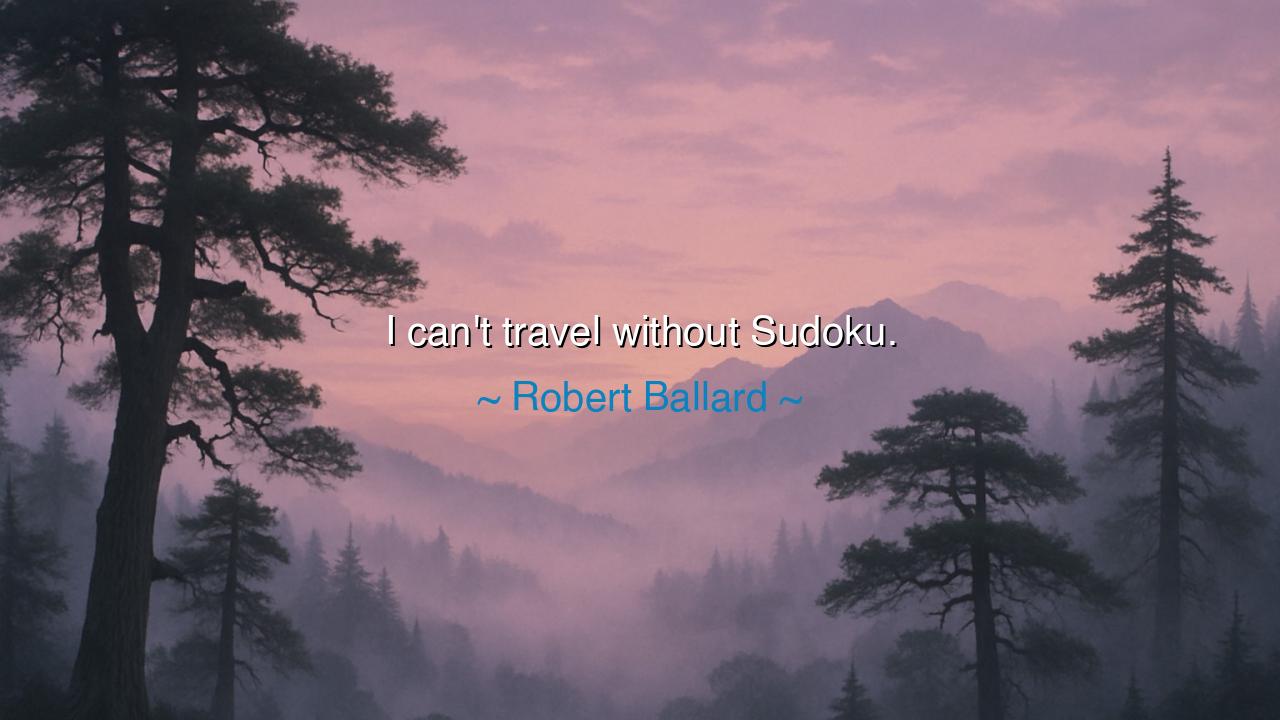
I can't travel without Sudoku.






The words of Robert Ballard — “I can’t travel without Sudoku.” — may appear simple, even playful, yet they conceal within them a deeper meditation on the human spirit and its longing for order amid chaos. Ballard, the famed explorer who descended into the abyss of the oceans to uncover secrets like the wreck of the Titanic, reveals that even those who face the vast and unpredictable require small anchors, rituals that steady the mind. In this, Sudoku, a puzzle of logic and clarity, becomes more than a pastime — it becomes a companion on the road, a shield against the disarray of endless travel.
To travel is to move constantly between the known and unknown. The body is uprooted from familiar soil, cast into airports, trains, ships, and strange lands. In such movement, the mind can grow restless, unsettled, wandering as aimlessly as the journey itself. Yet the practice of a simple discipline — in this case, Sudoku — brings harmony. Each puzzle is a universe where chaos gives way to pattern, where confusion yields to clarity. In this act, the traveler finds inner stillness, even when the world around him is in motion.
The ancients also sought such anchors. Marcus Aurelius, emperor and philosopher, carried with him not a puzzle, but his Meditations — notes to himself, written in camps and palaces, reminders of reason and virtue amidst the tumults of empire. For him, the act of writing was his Sudoku, a way of imposing order on the clamor of war and governance. So too, monks traveling across medieval Europe carried prayer beads, repeating their chants to steady the heart. Each had their puzzle, their ritual, their practice — a way to remain whole while journeying through the uncertain.
Ballard’s choice is symbolic. Sudoku, unlike games of chance, demands patience, logic, and calm. It reflects the very qualities an explorer must carry into the unknown: the discipline to observe, the persistence to seek patterns, and the faith that clarity will come through perseverance. Just as he pieced together the hidden remains of shipwrecks on the ocean floor, so too does he piece numbers into alignment. In both, the act is the same: to wrest order from mystery, to discover the hidden harmony beneath the surface of confusion.
There is also wisdom in the humility of his admission. For though Ballard is a man who has faced the darkest depths of the earth, he confesses a reliance on something small, something ordinary. It teaches us that greatness is not lived in constant grandeur; even the most heroic souls require simple joys, rituals, and comforts to carry them through the strain of endless travel. The extraordinary is made bearable by the ordinary.
The lesson for us is clear: in our own journeys — whether across the globe or simply through the shifting seasons of life — we must carry with us practices that root us. It need not be Sudoku; it may be journaling, prayer, meditation, music, or the reading of wise words. But each of us requires an anchor, a discipline that steadies the spirit amid motion and change. Without it, we risk being lost not in the world around us, but within ourselves.
In practice, let each listener reflect: what is the Sudoku of your life? What small act or ritual restores order when all else is unsettled? Cultivate it, guard it, and bring it with you into your journeys. For it is in these humble practices that strength is found. As Ballard cannot travel without his puzzle, so too should we never walk through life without the practices that keep us grounded, centered, and whole.
Thus, his words, though spoken lightly, carry the gravity of wisdom: even the boldest explorers, those who traverse the unknown, rely upon quiet rituals to steady their souls. To journey outward, we must also journey inward, piecing together the scattered fragments of our minds into patterns of peace. And in this way, the humble puzzle becomes a mirror of life itself — a reminder that order can be found, even in the midst of great wandering.






AAdministratorAdministrator
Welcome, honored guests. Please leave a comment, we will respond soon